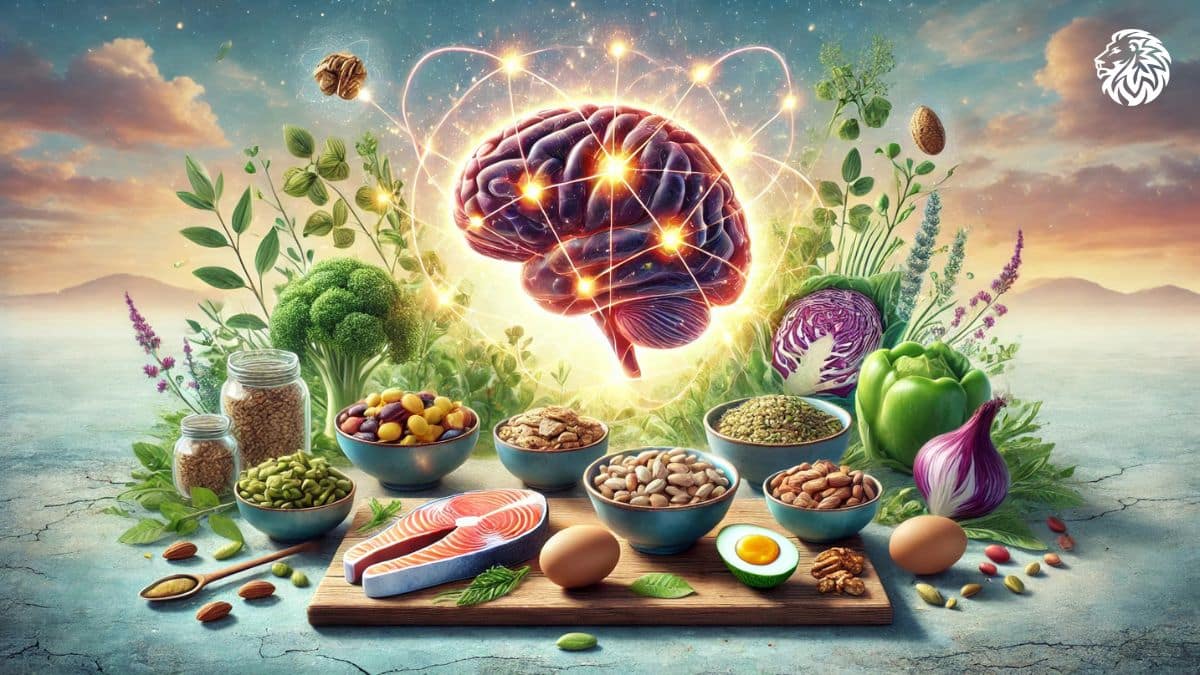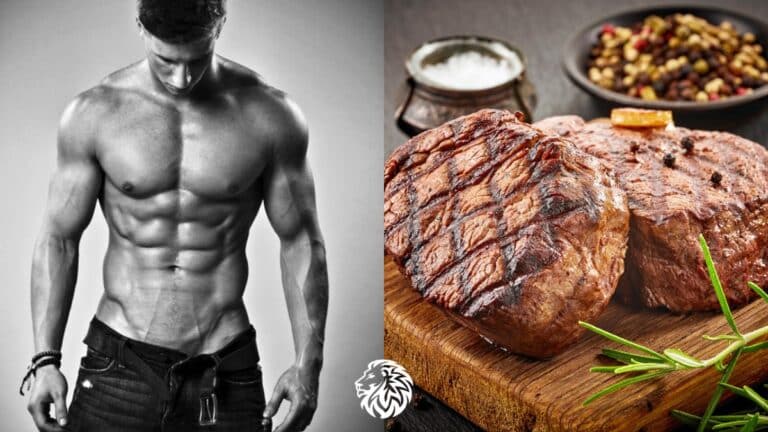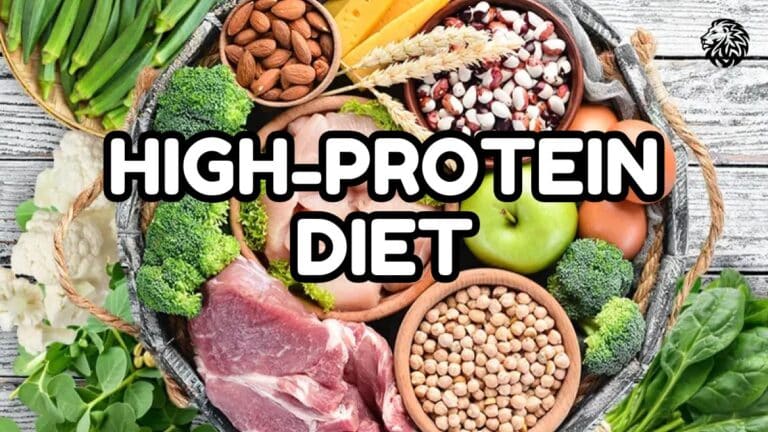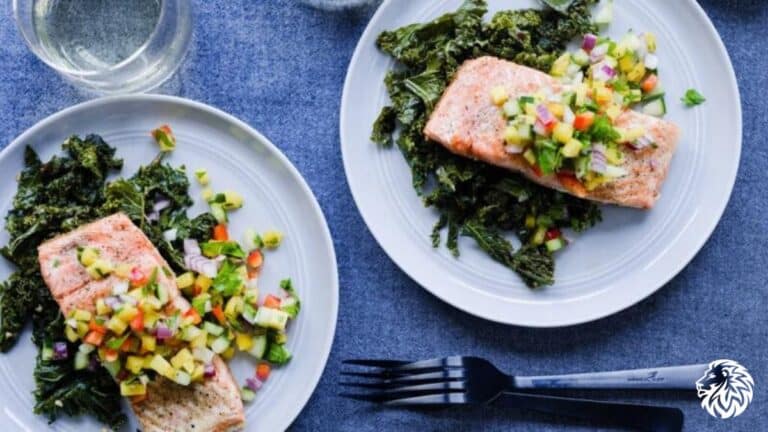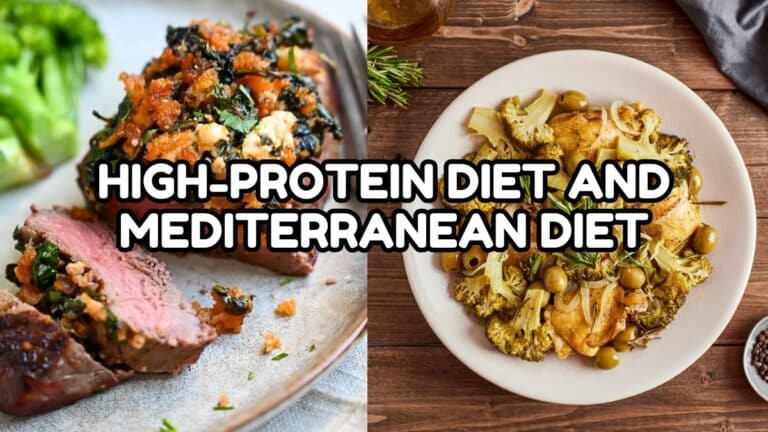A single dietary shift could sharpen your mind, stabilize your mood, and protect your mental clarity for years to come. High-protein diets are more than just a trend for fitness enthusiasts—they’re emerging as a cornerstone for mental health. By supplying the amino acids that fuel neurotransmitters like serotonin and dopamine, protein-rich foods play a vital role in enhancing focus, lifting mood, and building emotional resilience. Ready to discover how the right balance of nutrition can empower both your body and mind? Let’s dive into the science of high-protein diets and mental well-being.
Importance of Protein for Mental Health
Protein Consumption and Cognitive Decline
Eating enough protein isn’t just for bodybuilders—it can help keep your brain in tip-top shape too. According to a study by those brainy folks at Harvard Health Publishing, folks who chow down on enough protein tend to dodge the cognitive decline bullet later on. They tracked over 77,000 men and women for more than 20 years and what they found was pretty head-spinning:
- Swap 5% of your calories from carbs to animal protein and you could cut your dementia risk by 11%.
- Prefer the greens? Getting 5% of calories from plant protein instead of carbs can slash your risk by a hefty 26%.
- Loading up on beans and legumes—like peas and lima beans—three times a week drops the brain fade chances by a whopping 28%.
Here’s how the numbers stack up:
| Protein Source | Reduction in Risk (%) |
|---|---|
| Animal Protein | 11% |
| Plant Protein | 26% |
| Beans/Legumes | 28% |
Big props to Harvard Health Publishing for the figures!
Looking for ways to pack more protein into your diet and keep your noggin sharp? Swing by our guide on the best high-protein foods for some tasty suggestions.
Role of Protein in Protecting Cognition
Proteins are the unsung heroes of brain health. They’re packed full of amino acids—the building blocks for neurotransmitters that keep your thoughts and feelings humming along smoothly. Lack these guys, and you might see a dip in serotonin and norepinephrine levels, which isn’t great for your mental mojo (NCBI).
But not all proteins are created equal. You’ve got to dig into those nutrient-dense goodies:
- Cheese and Milk: Loaded with essential amino acids.
- Nuts and Seeds: A double whammy of protein and healthy fats.
- Legumes: Beans and peas, for that fiber and protein punch.
A plateful of these boosts brainpower. Need more ideas? Peek at our article on high-protein diet meal ideas.
Common high-protein munchies include:
| Food Type | Protein per 100g |
|---|---|
| Cheese | 25g |
| Milk | 3.4g |
| Almonds | 21g |
| Sunflower Seeds | 20g |
| Lima Beans | 6.7g |
| Peas | 5.4g |
Stats thanks to Mind.
Grasping why a high-protein diet matters for your mental health helps you take control of your cognitive well-being. Dive into our tips on how to start a high-protein diet and kick off your path to a healthier brain!
High-Protein Diets and Mental Well-being
Protein Boosts for Brain and Feel-good Vibes
A high-protein diet does wonders for your noggin and your mood. It’s like giving your brain the fuel it needs to stay sharp and happy. Proteins break down into amino acids, which your brain loves because they help make those happy chemicals like serotonin and norepinephrine (NCBI). When you ain’t getting enough of these amino acids, your mood might take a nosedive.
Eating right for your mind means saying “nope” to processed junk. So, protein not only feeds your muscles but also keeps that brain working like a charm.
Peep this table about amino acids doing their thing:
| Amino Acid | Brain Helper | What It Does for You |
|---|---|---|
| Tryptophan | Serotonin | Keeps you chill, less worried, happier vibes |
| Tyrosine | Dopamine, Norepinephrine | Boosts focus, gets you pumped, more joy! |
| Glutamine | Glutamate | Sharpens the mind, boosts learning chops |
Hungry for better protein lists? Look into our best high-protein foods article.
Protein Lowers Inflammation and Lifts Your Spirits
Guess what? High-protein diets also tackle inflammation, which is like kryptonite to your mental health, linked with stuff like the blues and jitters. Chow down on enough protein and you can dial back the inflamed stuff.
Proteins bring those essential amino acids your body needs to mend itself. Tryptophan leads the charge in making serotonin, helping out the brain big time. But heads up: sometimes too much animal protein can play bouncer at the brain’s tryptophan party, affecting serotonin (BMC Public Health). Mood swings with less serotonin? No, thank you!
Here’s a simple check on protein munching and feeling less down:
| Protein Munch | Depression Bailing Out |
|---|---|
| Low | Meh, not much help |
| Moderate | Hey, feeling better! |
| High | WOW, a lot better now! |
Dig into more brain-energy benefits in our high-protein diet perks section.
Even those sporty teens getting through rough patches could benefit from the power of high protein (Neuroscience News). Trying out a high-protein munch plan? Boost not just your body but your spirits too. For meal spices, dive into our protein-rich meal ideas.
Learn more about how a protein-packed plate and quieting inflammation work together for a happier you.
Nutrients Essential for Mental Health
Let’s dive into the world of eating right where high-protein foods meet mental mojo. Some nutrients go above and beyond in pepping up brain vibes. Here, we’re chatting about why amino acids and omega-3s are your mental health’s best buddies.
Amino Acids and Brain Function
Think of amino acids as the unsung heroes of your brain. They’re the little marvels that make neurotransmitters tick—the brain’s own messenger pigeons, if you like. If you’re skimping on these, expect neurotransmitters like serotonin and norepinephrine to take a snooze, putting you in a funk, as proven by science folks over at NCBI.
Your diet loads up on protein, your tummy breaks it down, and boom—amino acids are ready to get into action. They help make the stuff that keeps your mood, brainwork, and emotional health in check.
| Neurotransmitter | Amino Acid Precursor | What It Does |
|---|---|---|
| Serotonin | Tryptophan | Keeps mood right, helps you snooze |
| Dopamine | Tyrosine | Lights up rewards, gears up motivation |
| Norepinephrine | Phenylalanine | Handles stress, keeps you on your toes |
To really get your head in the game with a high-protein diet, fill up on foods loaded with these amino acids. Load your plate with lean meat, fish, eggs, milk stuff, beans, and other goodies from high-protein diet ideas.
Omega-3 Fatty Acids and Mental Health
Omega-3s: these fats are all about brain fuel and keeping your mind sharp. They fight inflammation and give your neurons a safety net (Mind). You’ll find them swimming in fish, tucked away in seeds and nuts, and hanging out in leafy greens.
Dabbling with omega-3s might ward off the blues or give you a leg up in dealing with them. Still, experts can’t seem to agree on how much they’re a silver bullet against depression.
Omega-3-Rich Foods
| Food | Omega-3 Content (mg per serving) |
|---|---|
| Salmon (100g) | 2,260 |
| Chia Seeds (28g) | 4,915 |
| Walnuts (28g) | 2,570 |
| Flaxseeds (28g) | 6,388 |
Keep your omega-3s in check by snacking on these powerhouse foods. Curious about other benefits? Wander over to our piece on high-protein diet perks.
Both amino acids and omega-3s are champions for your noggin. A well-rounded, protein-packed feast can help keep your brain buzzing and may chase away those down-in-the-dumps days. Check out how to kick-start your own high-protein journey with our guide to getting started packed with pro tips and meal hacks.
Effects of Protein on Mental Disorders
Digging into how protein impacts mental disorders ain’t just smart; it’s downright necessary if you’re flirting with a high-protein diet. Let’s gander at how missing out on protein can throw your brain’s chemicals outta whack and how chomping on protein ties into feeling blue.
Protein Deficiency and Neurotransmitter Levels
Eating enough protein is like oiling the gears in your brain. Your neurotransmitters – the signals zipping around up there – party down with amino acids, which basically make up the proteins. So, skimping on these amino acids can leave you short on serotonin and norepinephrine – two big shots when it comes to keeping you in a good mood:
| Neurotransmitter | What It Does | Deficiency Fall-Out |
|---|---|---|
| Serotonin | Keeps your mood steady and helps you sleep | Depression, anxiety up the wazoo |
| Norepinephrine | Keeps you awake and focused | Feeling sluggish, thinking gets hazy |
Keeping your protein intake in check ensures your brain’s supply chain of amino acids stays healthy, keeping mental problems at bay.
Dietary Protein and Risk of Depression
How much and what kind of protein you munch affects your mind, especially in terms of the blues. Some smarty-pants over at Neuroscience News reckon that scarfing down more protein is tied to less depression in some folks, but where you get that protein matters.
Ladies chowing down on animal protein have a knack for showing more depression, anxiety, and stress symptoms. This may be coz animal proteins can spike your homocysteine levels, which some say is a villain behind severe psychiatric issues. But go with plant protein, and no obvious ties to these mental headaches pop up.
| Protein Source | Mental Mojo |
|---|---|
| Animal Protein | Can lead to more depression, anxiety, and stress, plus higher homocysteine |
| Plant Protein | No big connection with mood swings |
Too much animal protein can block tryptophan, a serotonin starter, from getting its caboose into the brain. Thus, serotonin production can take a hit, potentially leaving you feeling low (BMC Public Health).
To keep your spirits high, think about swapping some animal proteins for plant-based ones. Check out our piece on a vegetarian high-protein diet for some starting points. Also, have a look at high-protein diet meal ideas to spice up your plate with variety.
Grasping the finer points of protein chow-time and its sway on neurotransmitters lets you call the shots on your diet and mood. For more scoop on diet’s dance with depression, make sure to wander over to our page on the high-protein diet and mental health.
Impact of Macronutrients on Mental Health
Take a deeper look into how the food you munch affects your mood, focusing on proteins and mental health. Spoiler: What you’re snacking on might be messing with your mind!
Association of Protein and Depressive Symptoms
Chewing over the connection between what you eat and how you feel isn’t just food for thought. There’s a twisty bond between meat munching and mental blues. A bunch of studies finds that folks, especially gals, who chow down on meat more often might wear a gloomy hat. One look into it shows women eating the most animal protein are more likely to feel down in the dumps (OR: 2.63; 95% CI: 1.45 to 4.71; P = 0.001), get jittery (OR: 1.83; 95% CI: 1.04 to 3.22; P = 0.03), or be stressed out (OR: 3.66; 95% CI: 2.06 to 6.50; P < 0.001).
| Mood Mess | Odds Ratio (OR) | 95% Feeling Range | P-Value |
|---|---|---|---|
| Down in the Dumps (Depression) | 2.63 | 1.45 – 4.71 | 0.001 |
| Jitters (Anxiety) | 1.83 | 1.04 – 3.22 | 0.03 |
| Stressed Out | 3.66 | 2.06 – 6.50 | < 0.001 |
But hold your horses, plant-based proteins ain’t got the same issues. The same smarty-pants study couldn’t find a moody link with veggies. Seems like where you get your protein can make a big difference in mental highs and lows.
Want to smartly tweak your menu? Check out our tips for high-protein diet meal ideas and best high-protein foods.
Influence of Tryptophan on Mood Disorders
Tryptophan’s like that mysterious friend who plays a hidden part in every story. It’s a must-have amino acid, backing your brain’s serotonin, the happiness juice. Low serotonin’s been put on trial for causing grumpy days. Funny thing is, even though meat stacks tryptophan high, it might actually block this buddy from entering your brain, stunting serotonin and boosting the blues.
Here’s the nitty-gritty on why protein sources matter:
- Meaty Meals: Bingeing on animal proteins can skyrocket homocysteine, throwing your brain’s balance outta whack and spelling trouble for mental health (BMC Public Health).
- Veggie Protein: Plant-based proteins are the good guys in this story, not showcasing negative vibes for your noggin.
Peel back these layers and your diet can be a mental power-up. Get more deets on pumping up your protein game with our reads on high-protein diet and inflammation, high-protein diet for weight loss, and high-protein diet benefits.
Aim for those plant-packed meals, and give your brain a break while still living the high-protein lifestyle.
Protein Intake and Psychological Well-being
So you’re thinking about the link between a high-protein diet and your mood, right? Well, pull up a chair because it turns out, chomping on all that protein could do more than just build muscles — it might actually mess with your head too! We’ll unpack how sinking your teeth into protein can tweak your mental wellness, especially if you’re a lady, and how it pairs with the grumpies.
Gender Differences in Diet and Well-being
Ever feel like you and your guy pals are on different planets when it comes to diet? Turns out, research buddies over at NCBI say that’s kinda accurate. They’ve found that women’s psychological well-being takes a sweet leap with top-notch dietary quality, while guys? Eh, not so much.
| Gender | Feel-Good Factor with Top-Notch Diet |
|---|---|
| Female | Big Time Boost |
| Male | Nada |
So, if you’re thinking about spicing up your diet to lift your spirits, especially you ladies, going the high-protein route could be your next big thing. Check out what we’ve got to say about it in our high-protein diet for women article.
Protein Consumption and Depressive Symptoms
Let’s talk protein types because they’re not all the same when it comes to your noggin. If you’re munching more animal protein, particularly as a woman, you might find yourself wrapped in a bit more gloom, anxiety, and stress according to the whizzes at BMC Public Health. However, plants? They’re all chill vibes here!
| Protein Type | Depressive Symptoms (Odds) | Anxiety Symptoms (Odds) | Stress Symptoms (Odds) |
|---|---|---|---|
| Animal Protein | 2.63 | 1.83 | 3.66 |
| Plant Protein | No Bad Vibes Here | Smooth Sailing | All Cool |
Seems like where your protein comes from really counts. If mental wellness is your jam, getting more plant protein on your plate might just be the way to go. Discover some tasty high-protein foods to mix into your meals for a mood-friendly diet.
Want more nuggets of wisdom on how what you eat links up with your headspace? Check out our full-on guide to high-protein diet benefits.
